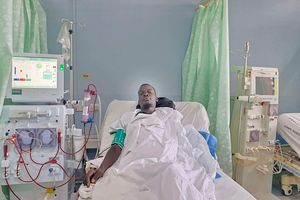Why Kenya still records few kidney transplants and more dialysis

Ms Grace Atieno lies on a hospital bed during a dialysis session at Jaramogi Oginga Odinga Teaching and Referral Hospital.
What you need to know:
- The biggest challenge is the availability of donor organs. In Kenya, only living donors up to the fourth degree of consanguinity are legally allowed to donate a kidney.
A shortage of donor organs, legal restrictions and health limitations are limiting kidney transplantation despite it being the best treatment for kidney failure, leaving many patients relying on dialysis, which is costly, time-consuming and associated with a lower quality of life.
Prof Ahmed Sokwala, a consultant nephrologist at the Aga Khan University Hospital, said that although kidney transplantation offers a significantly improved quality of life and longer life expectancy, these barriers prevent many patients from undergoing the procedure.
"The biggest challenge is the availability of donor organs. In Kenya, only living donors up to the fourth degree of consanguinity are legally allowed to donate a kidney. This restriction prevents many willing and compatible donors from offering a kidney, limiting the number of transplants available," he said.
Unlike other countries that allow cadaveric (deceased donor) transplants, Kenya relies solely on living donors, which reduces the number of kidneys available for transplant.
Prof Sokwala noted that even when a patient finds a potential donor, they may not always qualify for a transplant due to underlying health conditions. Chronic conditions such as diabetes, cardiovascular disease and advanced age can make the operation too risky.
However, the expert noted that not every dialysis patient is a transplant candidate. “Some patients have other medical conditions that make the procedure dangerous, leaving dialysis as the only viable option," said Prof Sokwala.
Another challenge is that some patients prefer to remain on dialysis rather than undergo transplant surgery. A kidney transplant requires lifelong use of immunosuppressive drugs to prevent organ rejection, which carries risks such as infection and side effects.
"For some elderly patients, dialysis appears to be a safer option than surgery and medication management," he added.
Misinformation and lack of awareness also contribute to the problem. Prof Sokwala noted that many patients believe that a transplant abroad will give better results, but Kenya now has the expertise and technology to perform successful kidney transplants.
"Some patients still choose to travel abroad, only to realise later that they could have had a successful transplant locally, with lower costs and better follow-up care," he said. Choosing a local transplant eliminates the need for expensive travel, accommodation and the challenges associated with post-operative care in a foreign country.
Another growing concern is the rising incidence of kidney disease in Kenya. An estimated four million Kenyans - one in 10 people - suffer from some form of kidney disease. Diabetes and high blood pressure are the main causes as these conditions gradually damage the kidneys over time.
"We are seeing an increase in kidney disease because we have more cases of diabetes and hypertension," said Prof Sokwala. "But other factors such as obesity, smoking and poor dietary habits also contribute."
Age is another risk factor, as kidney function naturally declines at a rate of about one per cent per year after the age of 40. Environmental pollution and exposure to toxins are also thought to play a role in kidney damage.
Kidney disease can be classified as either acute or chronic. Acute kidney disease occurs suddenly, usually in very sick patients, and is often reversible with prompt treatment, which may include dialysis. In contrast, chronic kidney disease is characterised by a gradual loss of kidney function over time. It is often caused by factors such as high blood pressure, diabetes or genetic predisposition. If not treated early, chronic kidney disease can progress to complete kidney failure, requiring dialysis or transplantation.
Despite the challenges, Prof Sokwala acknowledged the significant advances in kidney transplantation in Kenya.
"For many years, patients had to travel abroad for transplants, but today we have the technology and expertise to perform them successfully here," he explained.
He pointed to the many benefits of local transplantation, including lower costs, less travel stress and better access to post-transplant care.
"One of the biggest challenges for patients who have a transplant abroad is follow-up care. If complications arise, they may find it difficult to access the necessary medical care locally. However, with a transplant in Kenya, follow-up care is more accessible and effective,” he said.
To reduce the burden of kidney disease, prevention is essential. The World Health Organization recommends maintaining an active lifestyle, controlling blood sugar and blood pressure, eating a healthy diet low in salt and processed foods, avoiding excessive use of over-the-counter painkillers and quitting smoking.
"In many cases, kidney disease is preventable. The earlier we adopt healthier habits and monitor our health, the better our chances of avoiding dialysis and transplantation in the future," said Prof Sokwala.





